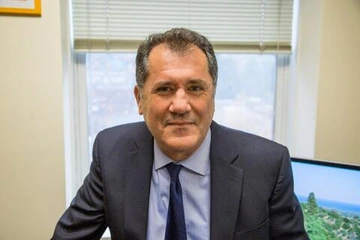When

Monday, October 13, 2025, 12:00 p.m.
Aristidis Veves, MD, DSc
Rongxiang Xu, MD, Professor of Surgery, Harvard Medical School
Director, The Rongxiang Xu, MD, Center for Regenerative Therapeutics
Beth Israel Deaconess Medical Center
"Advanced Treatments for the Management of Diabetic Foot Ulceration"
Keating 103 | Zoom link
Host: Swarna Ganesh

Abstract: Diabetic foot ulceration (DFU) is a major problem in diabetic patients, as more than 15% of them are expected to develop DFU within their lifetime, resulting in over 750,000 diabetic foot ulcerations and 70,000 lower extremity amputations per year in the United States alone. Given the severity of the problem and the limited efficacy of current therapies, new and more effective treatments are urgently needed.
Single-cell RNA-sequencing (scRNASeq) analysis provides deep insights into cellular function and disease pathophysiology by allowing transcriptomic profiling of individual cells in heterogeneous tissues. A recent study conducted in our unit focused on differences between DFU patients who heal (Healers) and those who do not (non-Healers), analyzing surgically removed DFUs via scRNASeq. The analysis revealed an enrichment of a unique population of fibroblasts, termed Healing Enhancing (HE)-fibroblasts, which overexpress MMP1, MMP3, MMP11, HIF1A, CHI3L1, and TNFAIP6 genes in Healers. Pathway analysis demonstrated activation of immune pathways, including IL6, HIF1A, and ILK signaling in these fibroblasts.
Leveraging the scRNASeq data, we performed an in silico screen of thousands of perturbagens, identifying metrifonate—an organophosphate cholinesterase inhibitor previously tested for Alzheimer’s disease—as a potential repurposed drug for DFU management. Experiments in diabetic db/db mice and pigs showed that alginate gels releasing metrifonate markedly enhanced wound healing, results that were confirmed in human skin transplanted onto diabetic nude mice and early pig studies.
Ongoing work in our lab has also shown that specially designed alginate bandages enabling controlled lipid nanoparticle (LNP) delivery of modified CHI3L1mRNA, IL-17AmRNA, FGF-2mRNA, and IL-2mRNA further improve wound healing in diabetic db/db mice and pigs.
Bio: Aristidis Veves is the Rongxiang Xu, MD Professor of Surgery at Harvard Medical School. He is the Founding Director of the Rongxiang Xu, MD, Center for Regenerative Therapeutics at Beth Israel Deaconess Medical Center and serves as the Research Director of the Joslin–Beth Israel Deaconess Foot Center.
He received his MD from the Aristotelion University of Thessaloniki (Greece) in 1981, his MSc from the University of Manchester (U.K.) in 1991, and his DSc from Athens Medical School (Greece) in 1993. Following his clinical training in Greece, he completed a Fellowship in Diabetes and Endocrinology at Manchester Royal Infirmary (U.K.) from 1987–1993. In 1993, Veves moved to the U.S. as a Research Fellow at the Deaconess–Joslin Foot Center (Boston, MA), where he later rose through the academic ranks at Harvard Medical School to become professor of surgery.
Veves' primary academic interests include diabetes complications, regenerative medicine, wound healing, and cardiovascular disease. His NIH- and DARPA-funded research bridges basic, translational, and clinical approaches to understand the mechanisms of diabetic complications and develop new therapeutic strategies. His areas of expertise include wound healing, diabetic neuropathy, diabetic foot disorders, and vascular reactivity.
